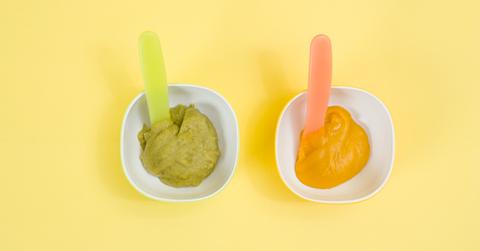Is Organic Baby Food Really Necessary? Here's What an Expert Says (Exclusive)
Mar. 1 2021, Published 2:28 p.m. ET

In the realm of parenting, there's an ongoing argument regarding baby food — does it have to be organic? Is feeding your child an all-natural brand truly necessary, or can parents get by with purchasing a cheaper alternative, sans that pricey organic label? The argument has been happening for several years now, and as health-minded folk, we were determined to get to the bottom of it.
"Some people might buy organic baby food to limit their babies' exposure to [pesticide] residues — since infants might be more susceptible to harm potentially caused by pesticides than are adults. However, residues on most products — both organic and nonorganic — don't exceed government safety thresholds," Head of Nutrition for Nucific, author, and renowned TV dietary expert, Dr. Amy Lee, tells Green Matters in an exclusive email interview.
Keep reading for more information on this matter.

Is it important to feed your baby organic foods?
Most parents want to feed their babies the safest foods possible, but organic doesn't necessarily mean safe. In February 2021, unhealthy traces of metals were discovered in a number of baby food brands, including some that sported the pricey organic label. That said, organic doesn't necessarily mean "healthiest" or "safest" — this simply happened because of metals in the air, soil, and water, without knowledge from the farmers or manufacturers.
Buying organic food, however, does guarantee that there aren't chemicals or pesticides knowingly used in the growing process for any ingredients that go into that little jar of mush. So, purchasing all-natural food over anything else does reduce the risk of having your baby exposed to those types of chemicals. However, Lee says it isn't absolutely necessary.
"The fact is, there is no hard data on what happens to babies who grow up as adults who were raised on organic vs. conventional foods. No one can say who’s getting the benefit or not," Lee tells us. "We know the nutrients are all the same when it comes to comparing an organic apple vs. a conventional apple; but ultimately, it is this fear of the unknown of what the baby is being exposed to."
So, while the hype may have some truth to it, organic isn't the only way to go.

Are there cheaper alternatives to organic baby food?
Lee tells us that there are cheaper alternatives to buying organic baby food, because organic brands can be incredibly expensive. Raised Real, for example, can cost up to $5 per meal, which is incredibly expensive and not doable, especially for young or low-income parents. Luckily, though, there are many cheaper alternatives to organic brands, that definitely won't sacrifice your baby's well-being.
"There are food products that are less likely to hold onto more pesticides after harvest. Meaning fruits and vegetables that have a naturally thick skin are probably things you can buy conventional. Meaning, avocado, cantaloupes, oranges versus things like spinach, strawberries, grapes, which may hold onto a lot of residues," she says. You can check out the 2020 Dirty Dozen and Clean Fifteen to learn which produce is more and less likely to hold onto pesticide residues.
But, Lee tells us you can get rid of the "residues" on non-organic food, to ensure they're totally clean."
"There are techniques that I have seen in ways to wash these residues off by use of white vinegar or soaking things longer which would allow someone to buy conventional without the fear."

Is making your own baby food a good idea?
Making your own baby food may be cheaper, but is it truly worth the extra effort, as opposed to buying ready-made meals? Lee tells us it's definitely safe and worth doing, if you have the time to do so.
"Making food at home is always safe and worthwhile! If you look at any food label, there tends to be more sugar added as well as the natural need for preservatives," Lee says.
"Yes, it does mean that anything homemade may perish and you must plan ahead to eat it up before it goes bad, and you have to cook more often," she continues. "With cooking, you can control the amount you buy and of course, you can prep meals for babies as you do for adults. Put things in the freezer and use what you need. But I do feel that when food is homemade, there is more appreciation that goes into it and your baby would thank you."

Parenting debates are truly never-ending, and you're likely to start a fight in a room of seasoned mothers by telling them organic baby food isn't totally necessary. So, new parents, rejoice: there are cheaper — and equally-safe — alternatives.